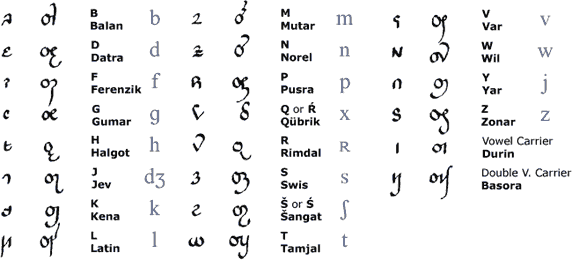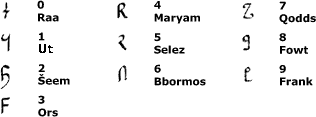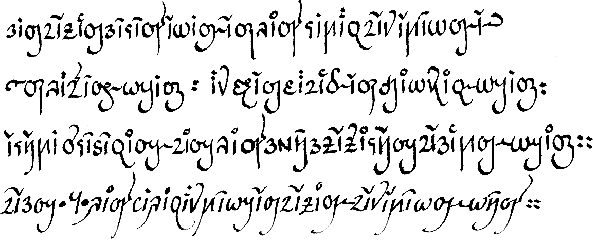The Lam-Lammarok Alphabet was invented by Simon Halfdan Hvilshøj Andersen in December 2005. His first drafts were of a writing highly inspired by the Fuþark runes for the shape and Tolkien's Tengwar for the system of stems and bows, as a matter of fact, the only letter that remained from those drafts is Latin.
Simon uses the Lam-Lammarok alphabet to write Erlod-Lammarok-Tiil a language he has invented for use in stories he's writing.

Note: In this table, the letters' final form (the glyph on the right, the other one is the medial/initial form) which is used to form double consonants are not presented, to form them, one just have to remove the Final Carrier from the glyph.

When B, D, G, K, P and T are doubled, the resulting sound comes from the back of the throat. For example, a double Tamjal will sound like the Arabic Ţāʼ (ط), or a double Kena will sound like the Arabic Qāf (ق). All other consonants, when doubled, are pronounced with a short pause in between. Double vowels correspond to the same sound, but twice as long. Those rules apply to human speakers, as the Braqaqi (the inhabitants of Bem-Lammarok) are capable of pronouncing sounds that we, humans, cannot.

Kalaalitk: Separates numbers from the rest of the text
Ots, Mistal: Used as opening and closing hyphens
Vustat: Groups two words, in transliterated texts, it is
recommended to use a hyphen (–) to represent Vustat, but that
practice is not mandatory.
Toramktat: Separates sentences, can be transcribed as a coma,
column, semi-column, period, exclamation mark, or question mark.
Rag: Opening parenthesis
Adal: Closing parenthesis
Ogtos: Marks the end of a paragraph
Marfut: Opening quotation mark
Loksat: Closing quotation mark

Numbers are written with the least significant cipher on the right of the number. They are commonly surrounded by two Kalaalitk to separate them from plain text, that rule is not mandatory. The decimal separator is either the diacritic of Ddon Utt (U) placed on a space ("U" means "Part" in Erlod), or a single Kalaalitk. The latter form is preferred when writing mostly numbers such as in equations while the former method is used when writing mostly text.

Sok Manük sivil atoy–af, bul voler maralitk-af bemmiz–ttos.
Erddak demüq–af kkutrruur–ttos. Avaaloon vizir ut–mut bul
swiisnannuvaat masülk–ttos.
(Mast–ut bul Gobur Erlittak Manük–Maralitk–tiil)
All human beings are born free and equal in dignity and rights. They
are endowed with reason and conscience and should act towards one another
in a spirit of brotherhood.
(Article 1 of the Universal Declaration of Human Rights)
Atemayar Qelisayér, Irxti Modern Alphabet (I.M.A.), Jeernervaniaan Standard Extended alphabet (JSEA), Lam-Lammarok, Obúka lún Êkimyú
Constructed scripts for: Ainu | Arabic | Chinese languages | Dutch | English | Hawaiian | Hungarian | Japanese | Korean | Lingala | Malay & Indonesian | Persian | Tagalog / Filipino | Russian | Sanskrit | Spanish | Taino | Turkish | Vietnamese | Welsh | Other natural languages | Colour-based scripts | Tactile scripts | Phonetic/universal scripts | Constructed scripts for constructed languages | Adaptations of existing alphabets | Fictional alphabets | Magical alphabets | A-Z index | How to submit a constructed script
[top]
You can support this site by Buying Me A Coffee, and if you like what you see on this page, you can use the buttons below to share it with people you know.

If you like this site and find it useful, you can support it by making a donation via PayPal or Patreon, or by contributing in other ways. Omniglot is how I make my living.
Note: all links on this site to Amazon.com, Amazon.co.uk
and Amazon.fr
are affiliate links. This means I earn a commission if you click on any of them and buy something. So by clicking on these links you can help to support this site.
[top]